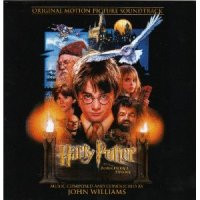- Composed by John Williams
- Warner Sunset / 2001 / 73:26
John Williams has written so many great fantasy scores, probably more than anyone else. Expectations for his music for the first Harry Potter movie were vast and the hype surrounding every aspect of the movie certainly extended to the music. While many will take much delight in the album, its function in the film is more open to debate. I’m not convinced these days that Williams pays that much attention to how his music is going to sound in the movie, he writes music for music’s sake – great for albums, not so great for films.
Harry Potter has some particularly enjoyable moments. The two themes, “Hedwig’s Theme” (whose title is mysterious to say the least, since it doesn’t seem to be associated with Hedwig in any way) and “Harry’s Wondrous World” are certainly standouts – but as is sometimes the case, they are repeated ad nauseum, arguably to the point where their impact is slightly minimised. There are a couple of other standout moments – “The Quidditch Match” and “The Chess Game” in particular. The latter resembles Alex North, of all people.
The problem is that there are times when this sounds a little like Williams is on autopilot, to an extent. It’s always difficult to assess such a situation, but like The Patriot, Harry Potter seems to be rather less than the sum of its parts. Listening to it, extracts from Hook, Home Alone, The Witches of Eastwick and The Phantom Menace are all too obvious, and it’s so repetitive it becomes more than a little dull after 73 minutes. Aside from the two themes, there aren’t the “wow” moments associated with Williams’s best.
In the movie itself, the score is a bit of a nightmare. It’s so loud, overbearing, bombastic and densely-orchestrated for its entire length that it completely overwhelms the film and really does harm it. The rest of the film is not without fault – Daniel Radcliffe is poor as Potter, seeming to have none of the necessary qualities apart from his physical appearance, and surprisingly the narrative structure doesn’t lend itself particularly well to film, since there’s no linear storyline but rather a series of set-pieces – but the score is the one thing that stands out as being a disappointment. Of course, average Williams is still better than most composers’ best, and the two themes are great. The album’s still recommended, but it’s not in the same league as the scores it closely resembles; Williams really does seem to be far more suited to scoring more serious, adult dramas these days. *** 1/2
Purchase Links – please support Movie Wave by making your purchases from amazon.com through these links if possible:
Buy the CD by clicking here
Buy the MP3 album by clicking here













[…] There are many elements that contribute to the making of a great film. Today however, we explore how sound influences a movie. There are three basic categories of a film; sound, music, dialogue, and sound effects. In the film “Harry Potter and the Sorcerer’s Stone” the sound of the movie that is first introduced to you is its theme song. The song which was written and composed by John Williams is played consistently for the first eleven minutes. Music is essential to the development of a film. It is because of the music that you know that the killer is around the corner when you can’t see them. Music sets the tone of the film. Some people believe that Mr. Williams was not creative enough with his score. James Southall wrote in a 2003 article that “Harry Potter has some particularly enjoyable moments. The two themes, “Hedwig’s Theme” (whose title is mysterious to say the least, since it doesn’t seem to be associated with Hedwig in any way) and “Harry’s Wondrous World” are certainly standouts – but as is sometimes the case, they are repeated ad nausea, arguably to the point where their impact is slightly minimized.” (Southall, 2003) Personally I think that the score was right on target. Harry Potter is a fantasy film; a simple score was all it needed. Mr. Williams, in my opinion created music that was fun, whimsical, and sometimes telling. Dialogue is pretty self- explanatory, it is the words or lines that are used in the film. In the beginning of film making the actors did not use dialogue. It is known as the silent film era. Our course book tell us that “three basic reasons to use dialogue: to further the development of the plot, to enhance characterizations, to establish very quickly important information the audience needs to know to understand the action (e.g., names, locations, dates, motivations, backstory). (Goodykoontz, Jacobs, 2011, pg.173) This is also true of “Harry Potter”, however not only did the viewer’s get treated to the Queen’s English, a made up language was used to convey magical spells. The use of sound effects in a film helps to hold the audience’s attention. Bombs blowing up, or cannons being fired provides the viewers with a sense of angsts, or nervousness. It tells the movie goers that something bad is going to/or has happen. In Harry Potter, the use of sound effects begins at the beginning of the film. In this clip Dumbledore turns off the street lights with his illuminator, listen to the different sound effects that were used just in this opening. https://www.youtube.com/watch?v=IpYHbdh9yTM (HPScenes, 2011) Southall, J. (2003) Harry Potter and the Sorcerer’s Stone. Movie Wave.com http://www.movie-wave.net/harry-potter-and-the-sorcerers-stone/ […]